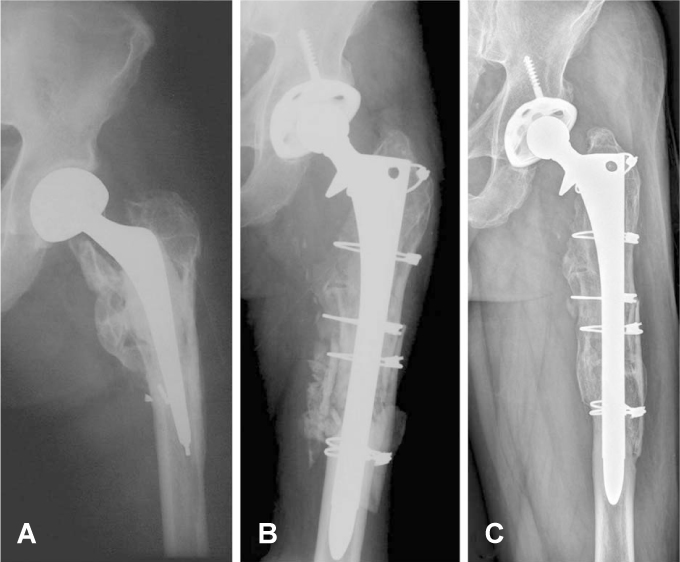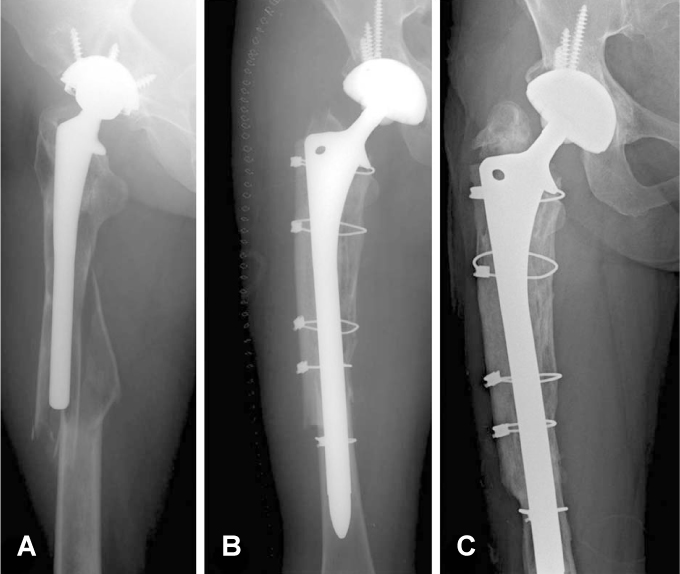J Korean Hip Soc.
2010 Sep;22(3):197-202. 10.5371/jkhs.2010.22.3.197.
Revision Total Hip Arthroplasty with a Strut Allograft and an Extensively Porous-Coated Femoral Stem
- Affiliations
-
- 1Department of Orthopedic Surgery, College of Medicine, Keimyung University, Daegu, Korea. min@dsmc.or.kr
- KMID: 1461170
- DOI: http://doi.org/10.5371/jkhs.2010.22.3.197
Abstract
- PURPOSE
We wanted to report on the outcomes of using a strut allograft and extensively porous-coated femoral stems in revision total hip arthroplasty that was performed due to extensive femoral bone loss.
MATERIALS AND METHODS
Between 1998 and 2005, we performed 167 consecutive revision total hip arthroplasties. Among them, twelve cementless femoral revision surgeries with a strut allograft and extensively porous-coated stems were retrospectively reviewed. The average follow up was 4.6 years. The average age at the time of the index revision was 55.9 years. The reasons for the revisions were periprosthetic fracture due to extensive osteolysis in 5 hips and aseptic loosening in 7 hips.
RESULTS
The Harris hip score improved from a mean of 40.8 points before revision surgery to a mean of 85.1 points at the latest follow up. Radiographic evidence of bony stable stems were present in 11 hips and a fibrous stable stem was present in 1 hip. Moderate stress-shielding was noticed in one hip. Nonunion of the allograft was observed in 1 hip due to deep infection. To date, no significant wear or osteolysis has been observed.
CONCLUSION
Revision total hip arthroplasty with a strut allograft and an extensively porous-coated femoral stem for treating cases of extensive femoral bone loss seems to be a reasonable choice. However, the concerns related to stress shielding, the difficulties in re-revisions and the complications associated with an allograft will require longer term follow up.
Keyword
MeSH Terms
Figure
Reference
-
1. Hozack WJ, Bicalho PS, Eng K. Treatment of femoral osteolysis with cementless total hip revision. J Arthroplasty. 1996. 11:668–672.
Article2. Emerson RH Jr, Malinin TI, Cuellar AD, Head WC, Peters PC. Cortical strut allografts in the reconstruction of the femur in revision total hip arthroplasty. A basic science and clinical study. Clin Orthop Relat Res. 1992. 285:35–44.3. Haddad FS, Spangehl MJ, Masri BA, Garbuz DS, Duncan CP. Circumferential allograft replacement of the proximal femur. A critical analysis. Clin Orthop Relat Res. 2000. 371:98–107.4. Gie GA, Linder L, Ling RS, Simon JP, Slooff TJ, Timperley AJ. Impacted cancellous allografts and cement for revision total hip arthroplasty. J Bone Joint Surg Br. 1993. 75:14–21.
Article5. Slooff TJ, Buma P, Schreurs BW, Schimmel JW, Huiskes R, Gardeniers J. Acetabular and femoral reconstruction with impacted graft and cement. Clin Orthop Relat Res. 1996. 324:108–115.
Article6. Ko HS, Jeong WS, Kim BJ, Kim YY. The correlation between the radiographic appearance and operative findings at the bone-cement junction in cemented total hip arthroplasty. J Korean Hip Soc. 1995. 7:35–42.7. Mulroy WF, Harris WH. Revision total hip arthroplasty with use of so-called second-generation cementing techniques for aseptic loosening of the femoral component. A fifteen-year average follow-up study. J Bone Joint Surg Am. 1996. 78:325–330.8. Berry DJ, Harmsen WS, Ilstrup D, Lewallen DG, Cabanela ME. Survivorship of uncemented proximally porous-coated femoral components. Clin Orthop Relat Res. 1995. 319:168–177.
Article9. Head WC, Emerson RH Jr, Higgins LL. A titanium cementless calcar replacement prosthesis in revision surgery of the femur: 13-year experience. J Arthroplasty. 2001. 16:183–187.
Article10. Cameron HU. The long-term success of modular proximal fixation stems in revision total hip arthroplasty. J Arthroplasty. 2002. 17:Suppl. 138–141.
Article11. Kim YM, Kim HJ, Chang K. Revision total hip arthroplasty with S-ROM modular system. J Korean Hip Soc. 1997. 9:190–197.
Article12. Park MS, Yang KH, Kang KK. Total hip revision with proximal modular femoral stem. J Korean Orthop Assoc. 1999. 34:1123–1128.
Article13. Han HJ, Kim SS, Choi SH. The use of the Wagner cementless revision stem in revision total hip arthroplasty. J Korean Hip Soc. 1999. 11:161–167.14. Wagner H, Wagner M. Hip prosthesis revision with the non-cemented femoral revision stem-10 years experience. Med Orth Techs. 1997. 117:138–148.15. Duncan CP, Masterson EL, Masri BA. Impaction allografting with cement for the management of femoral bone loss. Orthop Clin North Am. 1998. 29:297–305.
Article16. D'Antonio JA, McCarthy JC, Barger WL, et al. Classification of femoral abnormalities in total hip arthroplasty. Clin Orthop Relat Res. 1993. 296:133–139.17. Harris WH. Traumatic arthritis of the hip after dislocation and acetabular fractures: treatment by mold arthroplasty. An end-result study using a new method of result evaluation. J Bone Joint Surg Am. 1969. 51:737–755.
Article18. Engh CA, Massin P, Suthers KE. Roentgenographic assessment of the biologic fixation of porous surfaced femoral components. Clin Orthop Relat Res. 1990. 257:107–128.19. Moreland JR, Moreno MA. Cementless femoral revision arthroplasty of the hip: minimum 5 years followup. Clin Orthop Relat Res. 2001. 393:194–201.20. Gross AE, Blackley H, Wong P, Saleh K, Woodgate I. The role of allografts in revision arthroplasty of the hip. Instr Course Lect. 2002. 51:103–113.21. Head WC, Malinin TI, Mallory TH, Emersono RH Jr. Onlay cortical allografting for femur. Orthop Clin North Am. 1998. 29:307–312.22. Lawrence JM, Engh CA, Macalino GE, Lauro GR. Outcome of revision hip arthroplasty done without cement. J Bone Joint Surg Am. 1994. 76:965–973.
Article23. Moreland JR, Bernstein M. Femoral revision hip arthroplasty with uncemented, porous-coated stems. Clin Orthop Relat Res. 1995. 319:141–150.
Article24. Lawrence JM, Engh CA, Macalino GE. Revision total hip arthroplasty. Long-term results without cement. Orthop Clin North Am. 1993. 24:635–644.
Article25. Parprosky WG, Greidanus NV, Antoniou J. Minimum 10-year-results of extensively porous-coated stems in revision hip arthroplasty. Clin Orthop Relat Res. 1999. 369:230–242.
Article26. Weeden SH, Paprosky WG. Minimal 11-year follow-up of extensively porous-coated stems in femoral revision total hip arthroplasty. J Arthroplasty. 2002. 17:Suppl. 134–137.
Article27. Pak JH, Paprosky WG, Jablonsky WS, Lawrence JM. Femoral strut allografts in cementless revision total hip arthroplasty. Clin Orthop Relat Res. 1993. 295:172–178.
Article28. Kim YH, Kim JS. Revision hip arthroplasty using strut allografts and fully porous-coated stems. J Arthroplasty. 2005. 20:454–459.
Article29. Sugimura T, Tohkura A. THA revision with extensively porous-coated stems. 32 hips followed 2-6.5 years. Acta Orthop Scand. 1998. 69:11–13.
Article
- Full Text Links
- Actions
-
Cited
- CITED
-
- Close
- Share
- Similar articles
-
- Revision Total Hip Arthroplasty Using an Extensively Porous Coated Femoral Stem
- Revision of Total Hip Arthroplasty Using Extensively Porous-Coated Femoral Stem
- Short Term Results of Cementless Total Hip Arthroplasty With a Tapered Femoral Component
- Mid-term Results of Primary Cementless Total Hip Arthroplasty with a Fiber Metal Taper Femoral Component and Trilogy Acetabular Cup
- Long-Term Results of Total Hip Arthroplasty with an Extensively Porous Coated Stem in Patients Younger than 45 Years Old



